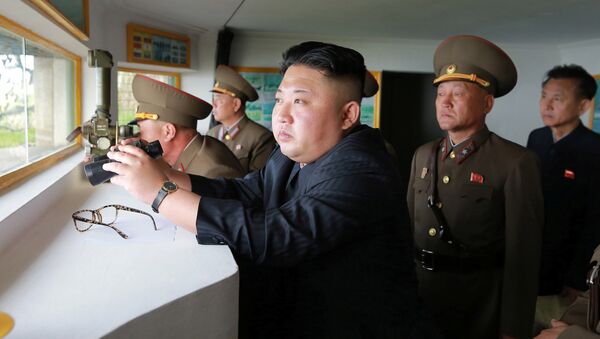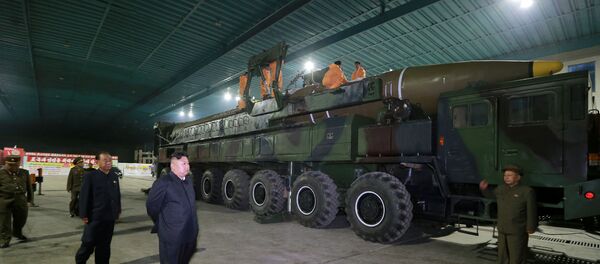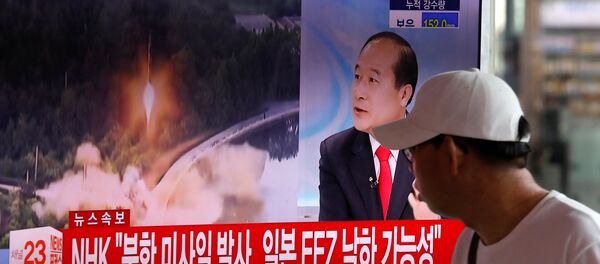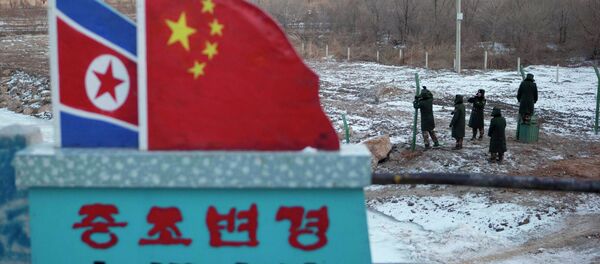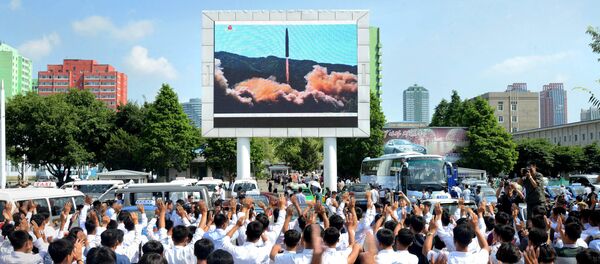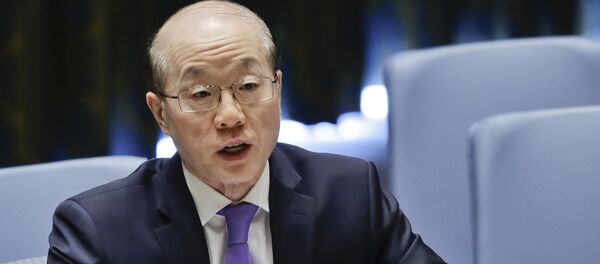"No, currently we do not have any contact or ties with the DPRK militarily. … China is right now united with the international community to seriously honor UN resolutions, and we hope we eventually may find a solution to these problems," Sen. Col. Zhou Bo, director of the Center for International Security Cooperation of the Chinese Defense Ministry, told Channel News Asia.
Tensions Between China, North Korea
"This is not only cutting off bilateral contacts, but complying with the demands made by the United Nations," he told RT.
Zhou Bo underscored that Beijing has repeatedly made its position clear to Pyongyang, but the situation is complicated by North Korean missile tests and the deployment of THAAD missile systems in South Korea. He noted that the suspension of military ties indicates a change in Beijing-Pyongyang bilateral ties.
Georgy Toloraya, director of the Russian Academy of Sciences' Center for Russian Strategy in Asia, pointed out that the move indicates the level of tensions between China and North Korea. According to the expert, Beijing regards Pyongyang’s nuclear and missile program as a threat.
"China sees that the tensions provoked by the buildup of the North Korean nuclear tests have a negative effect on the situation on the Korean Peninsula. For example, one of the results is the THAAD deployment near China’s border. A military confrontation, even a local conflict near China’s border, would lead to a crisis on East Asia and undermine China’s trade," Maslov said.
'Brothers in Arms'
China and North Korea had maintained military contacts since the Korean War. In 1961, Beijing and Pyongyang signed a mutual aid and cooperation friendship treaty. According to the agreement, China must provide assistance to its neighbor in the event of an aggression.
Maslov underscored that in the beginning of the 21st century the Chinese and North Korean defense ministries intensified contacts.
"Their military cooperation developed since the early 2000s and reached its peak in 2011 when the sides exchanged military delegations and a meeting between the defense ministers was held," the expert said. According to him, Pyongyang was first of all interested in China’s experience in managing a military force.
"For example, the North Korean military learnt from China’s system of military training," Maslov said.
The expert suggested that China’s priority goal was to persuade North Korea to abandon its nuclear program in exchange for a nuclear umbrella, but the offer was rejected.
Maslov said that by cutting military contacts, China wants to signal that Beijing does not want to be a hostage of Pyongyang’s policy of escalating regional tensions.
"For a long time, North Korea stated that China was its real military partner that would protect it in the event of a conflict. Now, Beijing has de facto disavowed those claims," he said.
Concession to the US
"The Korean peninsula is the largest gunpowder area in the world with the highest risk of nuclear war, and is the largest hot spot in the world where there is always a risk of nuclear war," an editorial in the state-run Rodong Sinmun newspaper read.
Meanwhile, on Saturday, the two US strategic bombers were involved in joint drills with the South Korean military, practicing strikes on North Korean key targets. The maneuvers were part of a large-scale exercise of the US and South Korean forces. The drills were launched in response to the test launch of a North Korean intercontinental ballistic missile last Tuesday.
"Probably, China wants to play to the US on the cheap, by showing that military contacts have been cut off. But this move is unlikely to help resolve the North Korean problem," the expert suggested.
According to him, this decision will result in losing "communications channels and channels of pressure over North Korea."
"The North Koreans are driven into a corner. They feel isolated. This could be dangerous," Toloraya said.
Still No Alternative to Talks
The North Korean problem was actively discussed on the sidelines of the G-20 summit in Hamburg. The issue was on the agenda of talks between the leaders of the US, Russia, China, South Korea and Japan. The issue was also discussed at a bilateral meeting between US President Donald Trump and Russian President Vladimir Putin. No breakthrough decision was made though.
Earlier, Moscow and Beijing proposed a plan to de-escalate the situation. The plan suggested that North Korea declare a moratorium on nuclear and missile tests while the US and South Korea refrain from large-scale drills.
"Russia and China propose a different strategy that presumes gradually involving North Korea into dialogue while Moscow and Beijing could guarantee the implementation of agreements," Maslov said.
But such an approach would require concessions from Washington and Seoul.
"Russia and China could provide North Korea with security guarantees, but the stumbling block is whether Pyongyang will be ready to halt its nuclear tests and gradually decrease its nuclear arsenal, finally completely destroying it," the expert noted.
According to Toloraya, the current crisis cannot be resolved until Washington makes changes to its policy towards North Korea.
"Currently there is a stalemate because Washington does not want to admit that negotiations with North Korea are needed. There will be no progress until the US starts to talk. This is what Moscow and Beijing have called for in their roadmap," the expert concluded.
